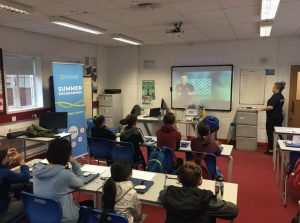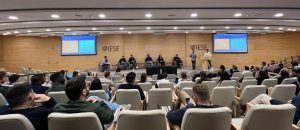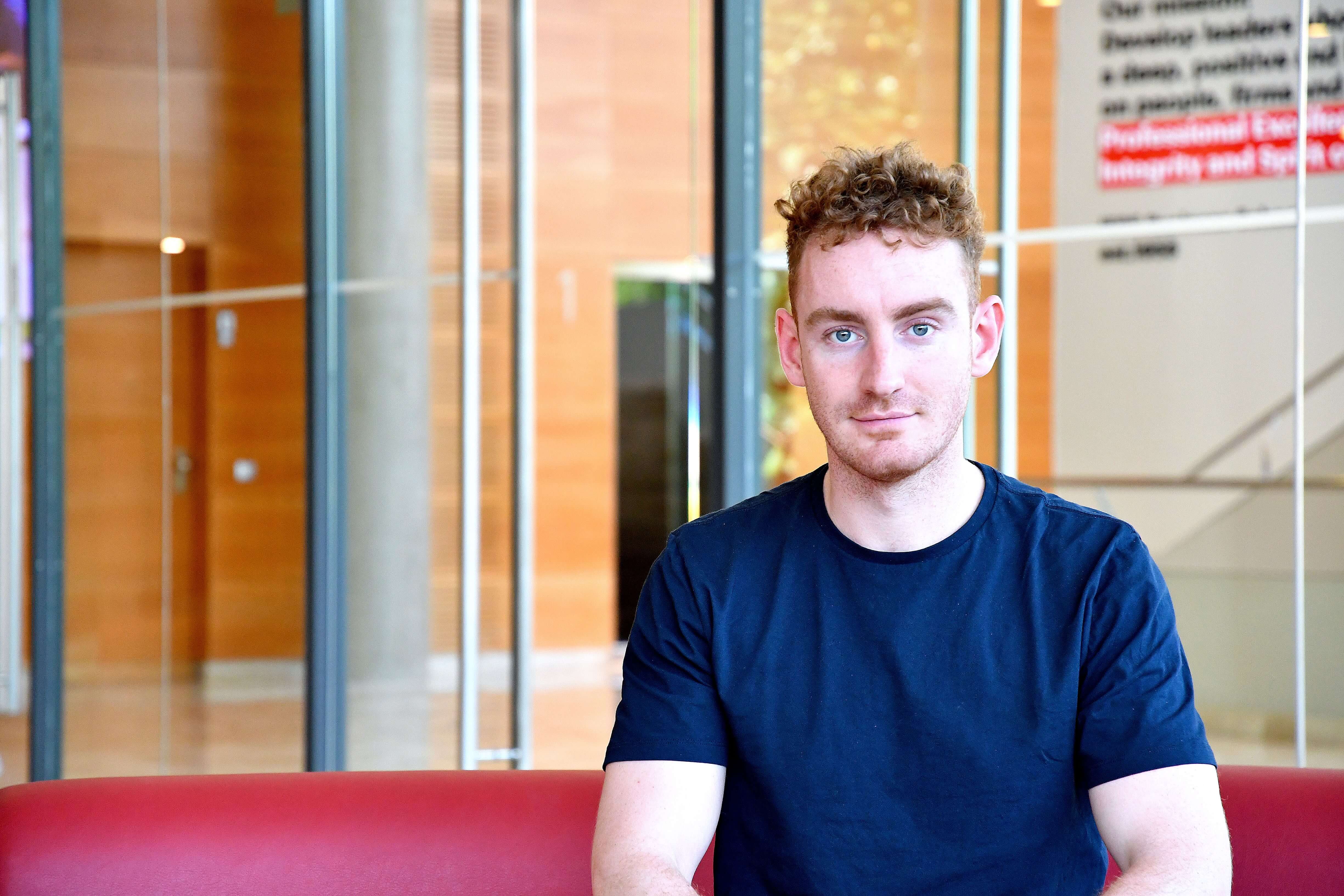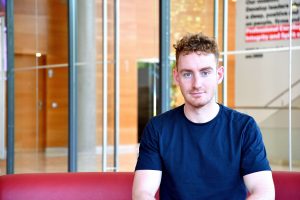Entrepreneurs are so often completely engrossed in day-to-day operations that they miss the wider perspective and impacts that internal and external forces can have on their business. An MBA provides the entrepreneur the opportunity to change that mindset by developing the skills and knowledge to identify and resolve any critical issues they face in creating a successful venture. Henry Hargreaves, MBA Class of 2022 already founded his own business before joining the IESE MBA. Why did he decide to pursue his MBA and what has he learnt from it?
The roller-coaster

The domestic coding programmes offered by Gledus.
The widening skills gap is an increasingly problematic reality facing many industries and businesses. Back in 2016 following my undergraduate studies, I set out to address a particular issue relating to STEM education and coding. My extensive research showed that coding was largely outside the school curriculum and not widely taught in schools, yet the demand from parents was high. The result for the tech industry is uninspired and underprepared students. The solution? Gledus – formed to offer a bespoke, high quality tech education. We developed a proprietary curriculum, collaborating with schools and universities across the UK to facilitate delivery to domestic students.
After the successful first trial cohort, I entered an entrepreneurship competition sponsored by the UK Foreign Commonwealth Organisation (FCO) and Tsinghua University to explore international collaborations. A resulting visit to China opened lucrative opportunities in the Chinese market to bring international students to the UK for short-term study programmes during the summer.

Visiting schools in Chengdu, China
Of course, the UK delivery of services required our partner schools across the UK being open and, indeed, accessible to international students. Then the COVID pandemic hit. Orders were cancelled and the business was stopped in its tracks. It was time to get back to the drawing board.
Often out of crisis comes opportunity
Despite this rather significant setback, I paused and reflected on what I had actually achieved. I had established a gap in the tech education sector, visited and developed relationships with multiple international partners, negotiated a value-add service offering and met tremendous people many who have since become friends, mentors and partners, all contributing to a strong, personal support network. I was actually very grateful for this foundation and was able to lean on it in helping to decide on my next steps, ultimately leading me to pursue the IESE MBA.
I anticipated that COVID would be a major problem before it took hold and that the world as we knew it would be significantly affected, and particularly my business. Gledus faced a hiatus, as demand literally fell away and showed no signs of returning for at least another academic year. I had to do something about it. I quickly began to think about whether I should change my business model but how, when and into what? And if it didn’t work what would I then do? I needed to widen my options so I opted to study for an MBA to give me the time and knowledge to properly assess my next steps.
The survival instinct
As I began looking at Business Schools I remember thinking how I could not only pivot myself but also my business. One thing was certain though. “Doing nothing” to wait and see how the pandemic materialised, really was not an option.
IESE was head and shoulders above the rest in terms of all round education and location. It just felt right. The MBA curriculum, whilst understandably demanding, reinforces opportunistic thinking at every stage of the value chain. The compulsory courses in the first year, particularly ABP (Analysis of Business Problems), drive critical thinking and encourage you to prepare for the worst, even in the good times – bittersweet given my personal experience! However, it was the Fundamentals of Entrepreneurship that lit the fire in my belly. I was inspired by the successes, failures and ultimately the journeys of the entrepreneurs in the case studies.
Throughout the first year, I made a conscious effort to stay connected to previous partners and clients from the business – I was genuinely interested in their response to coping with COVID. Schools in the UK were starting to open, although schools and flights in China remained closed for the foreseeable future.
Through my interactions, I identified an immediate opportunity to pivot the business online. After contacting my partners in China with the proposal, we received promising feedback and just a few weeks later were teaching 70 students for our first cohort. Thankfully I remained in contact with our school partners in the UK whose teachers were looking for extra tuition work. We have since delivered tuition to 300+ students.
IESE prides itself on offering high-quality and diverse academic experiences. The quality certainly doesn’t dip in the second year. Entrepreneurial Finance has given me a completely new toolkit. Since taking the course, I have been able to identify and evaluate the feasibility of additional opportunities for the business. However, the most eye-opening module and experience was undoubtedly the International Module in Nairobi. Whilst I learnt a huge amount about the commercial landscape across Kenya and broader Africa – in particular for EdTech – I also had the best 2 weeks of my MBA. Highly recommended!

Visiting the Kibera slum as part of the Nairobi International Module
The reinvention
From a career standpoint, there are two types of MBA students: The Hunters and The Explorers. The Hunters approach the MBA knowing exactly what career path to take. Contrastingly, The Explorers use the MBA to consider different industries, locations and functions. I was certainly of the latter. IESE facilitates opportunities for both, through student-run clubs, access to industry professionals, an open-door policy from professors, a hugely successful alumni and many other options. IESE’s resources are undoubtedly helpful, yet I extracted the most value from interacting with my international cohort and hugely experienced and talented classmates. Whether discussing business ideas (and receiving stern feedback) or asking for insights on their previous careers, it is impossible not to develop a rounded business knowledge and understanding. I should say, I have met several ‘Hunters’ who changed their mind following conversations with colleagues.

Students pitching ideas to investors as part of activities of the Startup and Entrepreneurship Club
As I reflect on the last 19 months, I have changed personally and professionally. Professionally, I have moved the business online, automating as much as possible with little involvement from myself other than to coordinate and plan activities. I have certainly drawn from knowledge and critical thinking during the MBA, sometimes using my business as a live case study with constructive criticism from my classmates, helping me to shape a way forward. Ironically the changes I have made to business has helped it to fund my MBA. Running a business while doing an MBA is probably not something I would recommend, as the demands can be overwhelming from the course alone. However, maybe for entrepreneurs that can hand over running of the business to a second in command, an IESE MBA would be a perfect fit?
The impact on me personally, however has been more profound. I went into the MBA as an explorer, open minded and ready to absorb as much as I could. I was also open to a change in direction. Maybe I didn’t want to return to being an entrepreneur?
For sure the IESE MBA is world class and rightly, challenging. What I did not expect was to meet such great people that will undoubtedly lead to lifelong friendships, or learn from amazingly passionate professors who brought subjects to life through their enthusiasm and stories and case studies and to realise how lucky I am to have experienced IESE and all that it brings. For this I am hugely grateful.
As an “entrepreneur” one brings a different skillset to the party, yet I felt confident in adding value in class discussions. Overall, the whole IESE experience has taught me to strive to be a better person and a better businessman. So I believe my personal pivot is to use my entrepreneurial flair in a corporate environment. Surely the best of both worlds!
As for my business, someone has made an offer to buy it outright, so the timing is good all round.
The spirit of service
Of course, most founders launch businesses with the eventual aim of selling them but often when the opportunity for a sale arises, it can be hard to let go as is the case for myself. In my situation, several professors have offered to help in this process beyond graduation. This offer of on-going support is testament to the philosophy, culture and learning environment IESE prides itself on – the spirit of service. This was so evident through the worst of COVID.
Entrepreneurship comes in all shapes and sizes and can also be used as a force for good in various ways. This has been demonstrated by my colleagues, who developed ‘ventures’ ranging from a hugely successful Women in Business conference to creating initiatives to fundraise for the victims of Ukraine – they showed grit, creativity and created value – all key characteristics in an entrepreneur.
My MBA experience is coming to a close, but I am absolutely ready for the next chapter.
IESE’s essence is in developing a rounded and ethical business person, the positive impact of which will likely stay with me for the remainder of my career.
It sounds cliché, but my advice for prospective students is to take action, put yourself out there and don’t be afraid to take risks. Let the IESE MBA do the rest!
Pursue your dream MBA! Take these next steps today:








That’s a great post! It’s very informational and helpful for the students who want to study MBA. Know more about MBA Abroad visit this site https://www.selectyouruniversity.com/